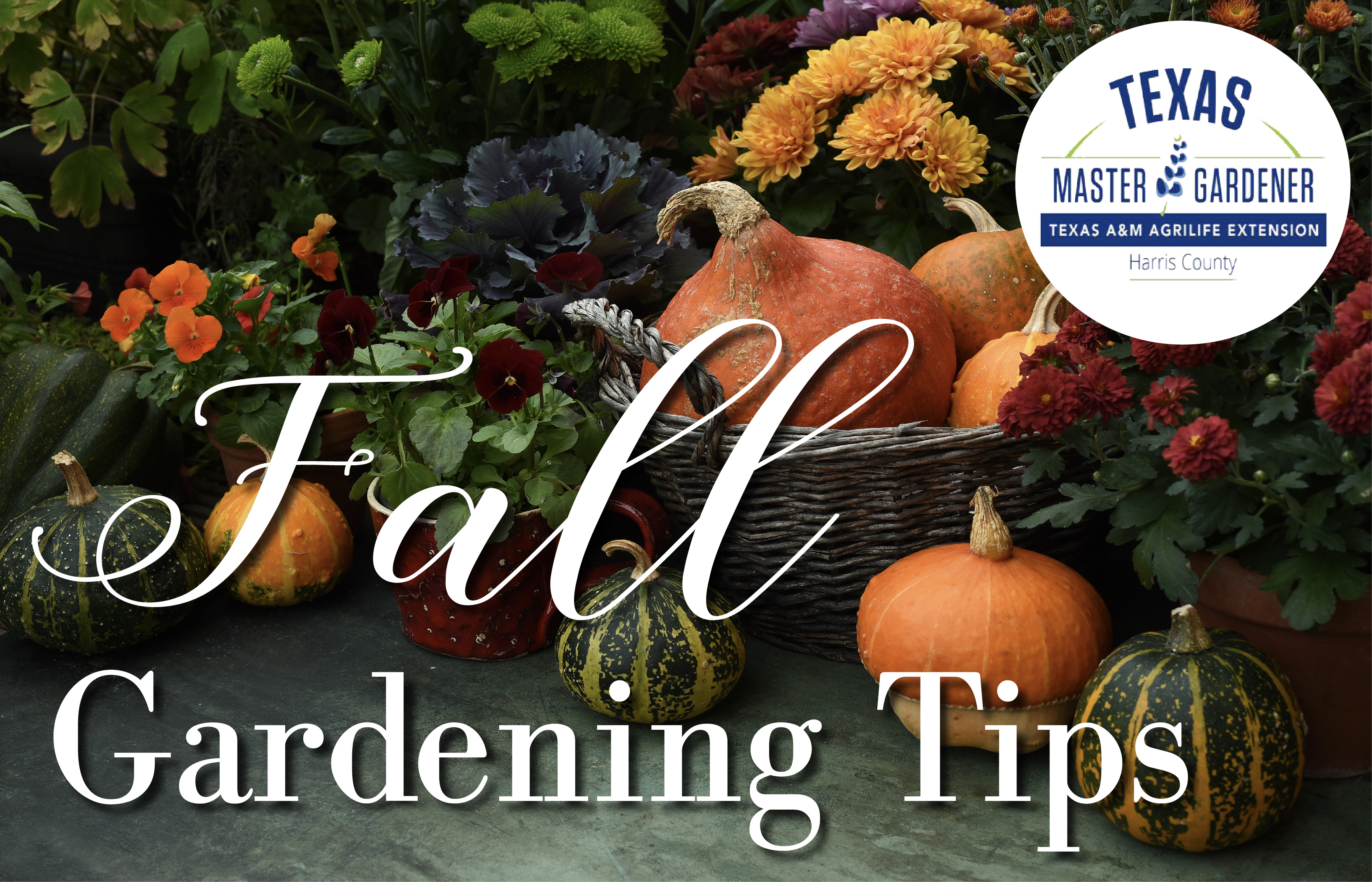
Harris County Master Gardeners Share Fall Gardening Tips for November and December
This information has been generously provided to Harris County residents free of charge by the Harris County Master Gardeners, an expert group of trained volunteers assisting Texas A&M AgriLife Extension Service in educating the community using research-based horticultural information.
Did you know that the Harris County Master Gardeners offer free training, events and other resources all year round? To learn more, visit hcmga.tamu.edu.
By Karen Shook, Harris County Master Gardener
"And all at once, summer collapsed into fall." - Oscar Wilde
It’s a bit cooler recently, but I am definitely ready for "summer to collapse into fall."
While our rainfall this year is above average, August through October have been relatively dry. Keep your beds mulched and continue to check for "too wet, too dry, just right" and water accordingly.
Gather those fallen leaves (yours and your neighbors if they don't use them) to use as mulch or as the "brown" in your compost. (If you pick up leaves from others, be aware that some may be gathered via lawn mower and may contain grass, weeds, or weed treatments.)
November and December are good times to prepare planting beds for the spring as well as for general clean up and maintenance.
November comes with a chance of frost so be sure to have your frost supplies ready. Historically, first frost in Zone 8 is November 7 to November 28. First frost in Zone 9 is November 25 to December 13.
Perennials, Ornamental Grasses and Natives
- Finish dividing spring blooming perennials. Most like to be divided every couple of years. Remember to keep the roots moist until the plant is replanted.
- As chrysanthemums and other perennials finish blooming, cut the stalks to the ground. Cutting back ornamental grasses can be done, but you might like the tan-colored seed heads as a winter display.
- You can still spread wildflower seeds. Gently rake them into the soil.
Annuals
- Plant cool season annuals, like pansies, violas, dusty miller, snapdragons, and stock. Fertilize and mulch.
- Existing annuals should only be fertilized if they are showing deficiency symptoms.
Bulbs
- Finish planting spring bulbs. For tulips and hyacinths, wait until December. Tulips should be refrigerated for at least three weeks. While bulbs are often planted in clusters or drifts, I sometime plant a bulb or two individually. I love the surprise each year when they bloom.
- Cut back foliage that has browned. Mark the location of dormant summer bulbs. It is also a good idea to mark where you plant spring bloomers so you don't accidentally dig them up or damage them.
- When you cut back iris foliage, gently dig some bone meal around the rhizomes.
Shrubs
- Plant or move woody ornamentals including shrubs, roses, trees and woody vines so they are well established before summer heat arrives.
- Keep azaleas moist in cold weather to avoid damage.
- In late December, most shrubs will be dormant and can be pruned. Pruning too early (before dormancy) can encourage plants to set out new growth. Avoid pruning shrubs that bloom in the spring.
Lawns
- Apply pre-emergent herbicide in early November if you didn't apply in October.
- Gather fallen leaves from your lawn and use as mulch or place in compost. Or using a mulching mower, mulch them down into the lawn to help cover the soil surface and deter cool season weeds.
Edibles (vegetables, herbs, berries, fruits)
- Oranges and satsumas may be ready to harvest. It is typically best if they are harvested before turning fully orange.
- Prepare the vegetable garden for spring planting by clearing dead plants, pulling weeds, and tilling the soil. Consider a cover crop.
- See the following link for recommended planting times for cool season crops like beets, radishes, lettuce: Harris County Veg Planting Guide
Groundcovers and Vines
- Plant hardy perennial vines in December. No fertilizing is needed until spring.
- Mulch tender vines covering the roots and lower stems.
- Ground covers can be divided and transplanted.
Trees
- Celebrate Texas Arbor Day on Friday, November 1, by planting a tree.
Source: Harris County Master Gardeners Urban Dirt Newsletter (November/December 2024 Edition)
About Urban Dirt
Every two months, Harris County Master Gardeners publishes an informative, resourceful newsletter entitled "Urban Dirt". This article was derived from the November/December 2024 edition. To read the November/December 2024 edition of this newsletter, click the button below.


